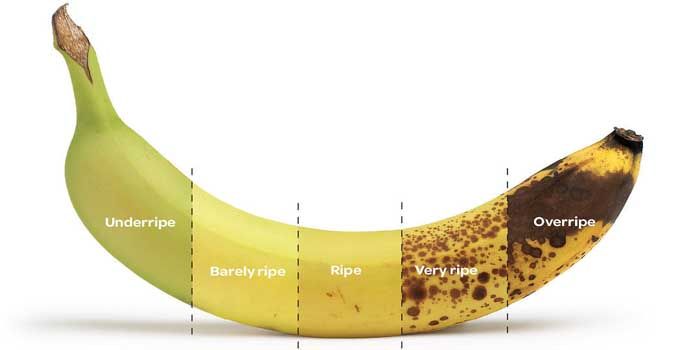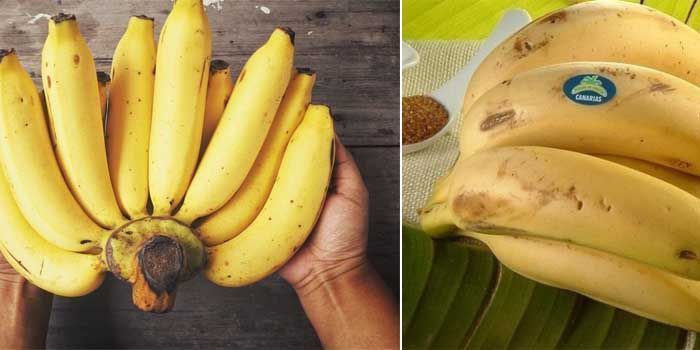Bananas are the reference food as far as potassium intake is concerned. They contain large amounts of sugars and are very nutritious.
Due to its importance, we will perform a scientific review of banana properties and the medical trials that are currently being carried out to strengthen the consumption of this international fruit.
As not only potassium lives man, we will analyze the nutritional composition and based on it, study its medical importance and the properties of the banana on our body.
Table of Contents
Nutritional characteristics of bananas
The first thing is to know the foundations of the properties of the banana. Its energy intake, dietary fiber, sugars and vitamin content. From there we can draw many conclusions when we evaluate the properties of bananas.
One of the things that bananas stand out for the most is their potassium and fiber content, as well as a high concentration of antioxidants. [Study]
Quantity for a medium-sized banana (110-120 grams)
| Composition | Concentration | Recommended daily allowance |
|---|---|---|
| Energy | 105 kcal | 5% |
| Proteins | 1.3 g | 3% |
| Carbohydrates | 27 g | 9% |
| Sugars | 14.4 g | |
| Fats | 0.4 g | 1% |
The banana stands out for an important contribution of energy and high concentration of sugars. Therefore, it is indicated as a fruit for sports practice, since they are carbohydrates of easy assimilation for moments of fatigue or physical exhaustion.
However, its consumption would be moderate for weight loss diets where other fruits with less caloric content (more water) would come into play. In any case, these calories provided by bananas will always be much more recommended than any other food rich in saturated fats (chips, pastries, sausages, etc.).
Properties of bananas and vitamin ratio
Quantity for a medium-sized banana (110-120 grams)
| Composition | Concentration | Recommended daily allowance |
|---|---|---|
| Vitamin A | 75.5 μg | 2% |
| Vitamin C | 10.3 mg | 17% |
| Vitamin E | 0.1 mg | 1% |
| Vitamin k | 0.6 mg | 1% |
| Riboflavin | 0.1 mg | 5% |
| Niacin | 0.8 mg | 4% |
| Vitamin B6 | 0.4 mg | 22% |
| Folate | 23.6 mg | 6% |
Among the vitamins, its high contribution of vitamin C, vitamin B6 and folates stands out. Vitamia B6 is important for the creation and functioning of protein enzymes, brain development from childhood, and strengthening the immune system.
As for the main minerals it highlights, as it could not be otherwise, potassium. An average banana provides 422 mg of potassium (equivalent to 12% of the recommended daily amount). In addition, it contains an adequate balance of other elements such as calcium (1% RDA), iron (2% RDA), magnesium (8% RDA) and manganese (16% RDA), among others.
Banana properties and proven benefits

Let’s take a look at the main scientific evidence of the properties of bananas in the face of numerous problems and diseases.
1. Regulates blood sugar
The regulation and balance of blood sugar is important considering that diabetes is becoming one of the main diseases of the Western world.
More and more natural phytocompounds are sought in plants, vegetables and vegetables in order to obtain new drugs or remedies for this disease.
As for the properties of bananas, the content of soluble fibers, especially the pectin, along with starch and potassium, acts by regulating sugar levels and digestion.
A diet high in fiber can balance post-meal sugar spikes. [Study]
Even though it is a fruit with high levels of natural sugars, the glycemic spikes it would cause in diabetic people are much lower than other rich foods in sugars.
People suffering from type 2 diabetes need to control such foods, such as bananas, by taking adequate control in sugar levels.
2. High fiber content for digestive transit
Dietary fiber has been linked to many health benefits, including better digestion.
A medium-sized banana provides about 3 grams of fiber, which represents 12% of the recommended daily amounts. It is a very high concentration that we can complement with cereals and other vegetables to complete the necessary daily intake.
Doing it this way brings a multitude of benefits. Excellent digestive activity and a reduction of very serious diseases such as colon cancer. [Study]
In bananas we can find 2 different types of natural fiber:
- Pectin fiber: its concentration decreases when the banana ripens.
- Starch fiber: it is found in greater concentration in less ripe bananas.
3. The properties of banana strengthen the cardiovascular system
A mineral intimately linked to the cardiovascular system is potassium, which regulates, among other things, blood pressure.
Therefore, consuming foods rich in this element is essential to reach the amounts that our body needs. Potassium is very present in fruits and vegetables, but not so much in foods such as meats, industrial products and pastries, where it is often abused in food.
In fact, it is a mineral that in many countries is consumed in deficiency according to the recommendations from medical institutions.
There are many scientific studies where they support the properties of potassium to regulate the cardiovascular system and prevent heart disease, specifically with the regulation of blood pressure.
4. High concentration of antioxidants
We can not forget the high concentration of antioxidants that block free radicals and are found abundantly in fruits and vegetables.
The properties of bananas are also characterized by their level and concentration in these protective substances of the organism.
Among them, specifically we find substances such as dopamine or catechins.
These elements are closely related to the cardiorespiratory system and the prevention of degenerative diseases
In this case, the dopamine present in the properties of banana does not penetrate the blood-brain barrier or produce a stage of happiness typical of other substances. It simply acts as a potent antioxidant.
5. Improve insulin sensitivity

Linked to the presence of fiber and the improvement of digestive transit, it has been scientifically proven how starch can improve insulin sensitivity above 30% in 1 month of consumption of this fiber, present in bananas.
It is still being studied to evaluate the real effect that this dietary fiber produces on insulin sensitivity.
6. Protects the kidneys
An element that interests keeping it in high concentrations to protect the kidney is potassium and, without a doubt, it is the star mineral of the banana.
Potassium intervenes in the renal regulation in a correct and balanced way and, therefore, is intimately linked to the consumption of bananas to reach the appropriate levels of this mineral in the body (and it is not always achieved).
Regular consumption of bananas in the medium term reduces the likelihood of kidney disease by up to 33%.
Likewise, this clinical trial has been contrasted in parallel with equally satisfactory results and a much higher percentage of prevention of kidney diseases thanks to the abundant consumption of fruits and vegetables.
7. Banana properties reduce muscle cramps
One of the popular knowledge about bananas is the consumption by athletes to reduce muscle cramps when we subject the fibers and joints to high stress.
In addition to athletes, there are also people who suffer from cramps chronically, especially in the elderly.
The origin of muscle cramps seems to be that it is related to muscle hydration and electrolyte imbalance, where potassium has a lot to say.
It is still necessary to deepen the direct relationship between this mineral and the possibility of preventing muscle cramps, although the truth is that the consumption of this fruit is already implemented among athletes seeking to prevent these problems.
When to avoid banana consumption
Bananas, due to their nutritional composition, may not always be recommended, especially in people who suffer from allergy to any of its active compounds.
The main cause of allergy is the interaction of banana properties with serotonin, which can cause migraines in certain people.
Do you know more properties of banana?
